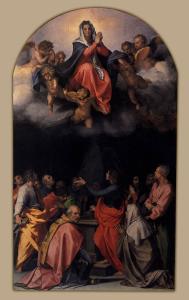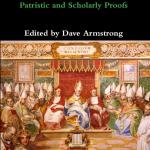
“Please Hit ‘Subscribe’”! If you have received benefit from this or any of my other 4,600+ articles, please follow this blog by signing up (with your email address) on the sidebar to the right (you may have to scroll down a bit), above where there is an icon bar, “Sign Me Up!”: to receive notice when I post a new blog article. This is the equivalent of subscribing to a YouTube channel. Please also consider following me on Twitter / X and purchasing one or more of my 55 books. All of this helps me get more exposure, and (however little!) more income for my full-time apologetics work. Thanks so much and happy reading!
***
This is a reply to anti-Catholic Reformed Protestant polemicist James Swan’s article, “Martin Luther and Mary’s Assumption” (12-18-06). His words will be in blue; Luther’s in green.
Here’s another one of those “Martin Luther was devoted to Mary” quotes. This time, Luther is said to believe in Mary’s assumption.
Well, yes. Lutheran scholars agree that he did, as I will document.
William J. Cole did not have anything to do with the Weimar edition of Luther’s Works.
Since it was compiled either before he was born or when he was very young, that would follow, yes.
He was a Roman Catholic scholar who wrote an article on Luther’s Mariology many years ago. . . . The quote is originally from WA 10(3), 268,13 to 269. The translation utilized is from Cole’s old article from 1970, “Was Luther a Devotee of Mary?” [Marian Studies XXI].
Yep. I put it online (probably the first person to do so). And that’s where I got it. There is nothing improper in this. A secondary scholarly source can be used if he or she cites a primary source. That’s what Cole did. Nor does a person have to read the original in a different language in order to cite a secondary source citing it in English. Swan — who knows why? — has this ludicrous notion in his head that this is what is required of everyone.
The quote is from Luther’s sermon of August 15, 1522. Cole mentions it was the last time Luther preached on the Feast of the Assumption, which should tip us all off on where Luther was heading with his “Mariology” (recall, Luther lived till 1546, thus this comment comes very early in his “Reformation.”). Cole quotes Luther as saying,
“There can be no doubt that the Virgin Mary is in heaven. How it happened we do not know. And since the Holy Spirit has told us nothing about it, we can make of it no article of faith.” [note from 8-2-24: actually, these are not Luther’s words; see the Addendum at the end]
Now, one could say here that Luther leaves the door open for Mary’s assumption. Perhaps he did in 1522. . . . Here we find Luther living up to “Sola Scriptura.” One is not [to] believe in the Assumption.
Not all Lutheran historians or other scholars would agree with Swan that Luther always thought his followers should “not believe in the Assumption.” Lutheran scholar Eric W. Gritsch, who was a major translator in the English set, Luther’s Works (edited by Jaroslav Pelikan), observed:
Luther affirmed Mary’s assumption into heaven but did not consider it to be of benefit to others or accomplished in any special way. (in The One Mediator, the Saints, and Mary, Lutherans and Catholics in Dialogue VIII, edited by H. George Anderson, J. Francis Stafford, Joseph A. Burgess, Minneapolis: Augsburg Fortress Press, 1992, 241; footnote 44; p. 382: “Sermon on the Festival of the Assumption, August 15, 1522. WA 10/3:269.12-13. Sermon on the Festival of the Visitation . . . August 15, 1522. WA 52:681.27-31.”; my bolded emphasis)
In the same book, twelve Lutheran and ten Catholic scholars participated. Their “Common Statement” (a sort of creed-like formulation agreed-upon by all) yielded some very interesting conclusions indeed:
(89) Luther preached on the Assumption . . . There were early Lutheran pastors who affirmed the Assumption as both evangelical and Lutheran.
(101) From the Lutheran side, one may recall the honor and devotion paid to the Mother of God by Luther himself, including his own attitude to the Immaculate Conception and the Assumption, which he accepted in some form. (p. 55; my bolded emphasis)
Luther signed an August 19, 1527 letter to Georg Spalatin in the following (very “unProtestant”) manner:
Yours, Monday after the Assumption of Mary, 1527. Martin Luther. (in Luther: Letters of Spiritual Counsel, edited and translated by Theodore G. Tappert, Vancouver: Regent College Publishing, 2003, 230)
He did the same eight years later, in a letter dated “the Friday after the Assumption of Mary 1535” (letter to Elector John Frederick, 20 August 1535, referenced in Luther’s Works, Vol. 2, p. 21, footnote 31).
It is not to be an article of faith.
Luther did state that. But that’s a separate issue from whether he believed it at that time.
Interestingly, Cole goes on to point out that Luther “used strong language….for the elimination of the Assumption as an aspect of the ‘hypocritical church’,” particularly in celebrating a feast for it. Cole cites Luther as saying in 1544:
“The feast of the Assumption is totally papist, full of idolatry and without foundation in the Scriptures. But we, even though Mary has gone to heaven, should not bother how she went there. We will not invoke her as our special advocate as the Pope teaches. The pope takes away the honor due to the Ascension of our Lord, Christ, with the result that he has made the mother like her Son in all things.”
Even this doesn’t particular quotation necessarily require that Luther himself gave up all belief in Mary’s Assumption, since he was discussing not the thing itself, but how the feast celebrating it was conducted in the Catholic Church (thus, he referred to invoking her, etc., which has nothing directly to do with the doctrine itself).
In fairness to the work of William Cole, Cole doesn’t take a stance one way or the other if Luther ever held to the doctrine of Mary’s Assumption. He simply says that for Luther the Assumption was of “little importance…” and Luther never explicitly “denied” it either.
Swan (the world’s greatest expert on how to make a citation) gets this wrong, too, and he refutes himself in his later article, “Revisiting Luther on the Assumption of Mary” (5-24-16). He himself quotes Cole from the same article, where Cole certainly did take a “stance“:
For Luther the Assumption seems not to be so much a matter of doubt as of little importance and this is perhaps the reason, as Max Thurian affirms, that Luther did not pronounce clearly on the subject, but was content simply to affirm it.
In summary, we can see that if the Feast is rejected, it is for reasons extraneous to the fact itself, which Luther never denied. Essentially, as Luther himself said in the same sermon the reason he does not celebrate it, “although she has gone to heaven” is that he sees it is a source of justifying invocation to Mary.
1) We are interested in Christian history, including the founder of Protestantism (who is an extremely fascinating figure). I’ve always loved history in general, and it’s much more interesting to me than fiction. Anomalies like this are interesting and educational by nature.*2) We would make the point that if a person committed to sola Scriptura believed in the Assumption, then it must be based in some fashion (assuming internal consistency) on the Bible, since these people reject authoritative apostolic tradition and an infallible Church.*3) If the founder of Protestantism believes in a Catholic “distinctive” then it’s no longer in fact exclusively a Catholic distinctive, is it?*4) We rejoice in any agreement from our Protestant separated brethren, since it means that we have that much more in common than we already do (which is quite a bit) and are more unified.
Luther did not write the exact quote Roman Catholics say he did. Rather, the quote is not from Luther, but from William Tappolet, author of the book, Das Marienlob der Reformatoren [The Marian Praise of the Reformers, from 1962]. The quote is actually Tappolet summarizing his personal view of Luther on the Assumption, or rather, providing a summary of (what he thinks is) Luther’s view. Then he cites Luther’s sermon for proof . . .
True to form, he proceeded to mock Catholic apologists (and if you know my ludicrous 20-year history with him, he especially had me in mind):
I suspect now may occur, at least on some Roman Catholic webpages, the disappearing Luther quote act, which has different variations.*Drumroll please.*Edited. Poof! Gone.*Or: Nope, we never cited this as a Luther quote. See.. it’s not on our webpage anymore, so it never happened.*Or: the documentation will be fixed: yep, we’re just great Roman Catholic researchers that figured out all of this stuff on our own.
In fact, I am not like James Swan at all: a person who seems to never be able to admit that he ever made an error in his research (at least not if I or any dreaded, despised Catholic had pointed it out). I have done none of these things. I accept the fact that he discovered an error that the Catholic William Cole made in an article that I cited. The original disproven “citation” remains above (with a note to this Addendum), and now I issue a retraction (which I will also announce on my blog). What Swan in his triumphant and arrogant correction, however, doesn’t appear to realize is that he had done the same thing that I did: accepted Cole’s “quotation” as genuine.
There’s nothing necessarily wrong with citing Cole, I’ve found useful information in his article. However, there is something wrong with not checking his references! Almost anyone can do this now. No excuses Roman Catholic apologists! Do your homework!
Again, he hadn’t done that himself in 2016, so his childish lecturing again merely exposes his own hypocrisy and shoddy research (just as bad as he claims ours is, if not worse, because of his constant self-absorbed and deluded claims of intellectual superiority). As I documented above, in his article on the topic almost ten years before that, dated 12-18-06, he is just as sure of the genuineness of the Cole “citation” of Luther as any Catholic:
The quote is from Luther’s sermon of August 15, 1522. Cole mentions it was the last time Luther preached on the Feast of the Assumption,. . . Cole quotes Luther . . . Now, one could say here that Luther leaves the door open for Mary’s assumption. Perhaps he did in 1522. . . .
No ultra-enlightened, academic skepticism here, is there? For over eighteen years, then, Swan didn’t do what he blamed us for not doing, until the light bulb went off in his head and he finally proclaimed in his article yesterday, “I have solved this mystery!”
Today the festival of our dear lady, the mother of God, is observed to celebrate her death and departure above. But how little this Gospel corresponds with this is plain. For this Gospel tells us nothing about Mary being in heaven. And even if one could draw from this text every detail about what it is like for a saint to be in heaven, it would be of little use. It is enough that we know that departed saints live in God, as Christ concludes in Matthew [Matthew 22] based on the passage in Exodus [Exodus 4] where God says to Moses, “I am the God of your fathers, the God of Abraham, the God of Isaac and the God of Jacob,” that God is not the God of the dead, but the God of the living.
These passages sufficiently prove that they live. But we should not try to figure out what their life is like up there for it is not necessary for us to know. It is also not necessary to discover it. Reason is incapable of it. Some great masters have understanding about some things and yet not about this. For there are three states of life. First, as a child lays in his crib he lives in God but hardly perceives it. Second, when we sleep we also are alive and are scarcely aware of it. Thirdly, when we definitely are aware and experience that we are living, even then we don’t know how.
Now since here on earth God deals with us in this meager prison (that is barely half a life), in such a way that we barely perceive how we live here, how much more can He give life in heaven where it is spacious and where is true life. So we cannot set up any definite limits or establish a rule as to how the saints live there since even here dreaming and crazy people live, but we can’t imagine how. It is enough to know that they live. But it is not necessary for us to know what that life is like. That is why I have always said that our faith always must rest upon what is known. We do not make articles of faith out of what doesn’t rest squarely on Scriptures, else we would daily make up new articles of faith. For this reason, those things that are necessary to believe which you must always preserve, which Scripture clearly reveals, are to be markedly distinguished from everything else. For faith must not build itself upon what Scripture does not clearly prove. So since the Scripture clearly says here that Abraham, Isaac, Jacob and all believers live, then it is necessary for you to believe that the mother of God lives. You can leave it in our gracious God’s hands what that life is like. Enough said about this festival. We will say something about the Gospel. (Festival Sermons of Martin Luther, Michigan: Mark V Publications, 2005, pp. 145-146)
The obvious question remains… does the Luther sermon Cole and Tappolet cite prove Luther believed in the Bodily Assumption of Mary? I’ve been over that before also. Read the context for yourself, either by visiting my old blog entry, Baseley’s English rendering of the sermon from Festival Sermons of Martin Luther, or the German text. The Bodily Assumption of Mary is being read into the context by Roman Catholics. A careful reader will notice nowhere in the context does Luther admit to believing in the Assumption of Mary, . . . In this brief synopsis offered by Gritsch, he appears to redefine what it means to be “Assumed” into heaven.
Yet Gritsch and the other Lutheran scholars think that Luther did believe in the Assumption, based on these two sermons. Who to believe? Will we accept the word of a notoriously sloppy and dishonest, relentlessly sophomoric anti-Catholic blogger like James Swan, even when it expressly contradicts Lutheran scholars (including one major translator of his works in English) in matters of what Luther believed? I will accept the conclusions of the Lutheran scholars and experts on Luther, thank you. Swan is playing the sophist’s game, as usual. Avoid people who do that like the plague! I certainly would utterly ignore Swan and his vapid antics, too, if it weren’t for my duty as an apologist to expose and refute his special pleading nonsense, lest folks be led astray by it.
*
Practical Matters: Perhaps some of my 4,800+ free online articles (the most comprehensive “one-stop” Catholic apologetics site) or fifty-five books have helped you (by God’s grace) to decide to become Catholic or to return to the Church, or better understand some doctrines and why we believe them.
Or you may believe my work is worthy to support for the purpose of apologetics and evangelism in general. If so, please seriously consider a much-needed financial contribution. I’m always in need of more funds: especially monthly support. “The laborer is worthy of his wages” (1 Tim 5:18, NKJV). 1 December 2021 was my 20th anniversary as a full-time Catholic apologist, and February 2022 marked the 25th anniversary of my blog.
PayPal donations are the easiest: just send to my email address: [email protected]. Here’s also a second page to get to PayPal. You’ll see the term “Catholic Used Book Service”, which is my old side-business. To learn about the different methods of contributing (including Zelle), see my page: About Catholic Apologist Dave Armstrong / Donation Information. Thanks a million from the bottom of my heart!
*
***
*
Photo Credit: Assumption of the Virgin (1526-1529), by Andrea del Sarto (1486-1530) [public domain / Wikimedia Commons]
Summary: Anti-Catholic Protestant polemicist James Swan tries his hardest to prove that Luther rejected Mary’s Assumption, but infinitely more qualified Lutheran scholars disagree.













